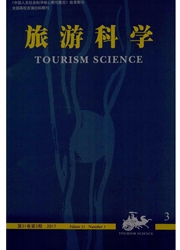

 中文摘要:
中文摘要:
海滨度假地衰退是国际旅游研究关注的热点之一,然而现有研究形成的两个理论范式——生命周期理论和转型理论都无法完满地解释中国海滨度假地衰退现象。本文以烟台牟平养马岛为案例,对其旅游开发历程进行梳理研究后发现,处于转型时期的中国传统海滨度假地往往遭遇制度性衰退和竞争性衰退的双重困境。中国海滨度假地的复兴必须首先摆脱行政经济的禁锢,走市场化改革的道路。
 英文摘要:
英文摘要:
The declination of coastal resorts is one of the hot academic topics of international tourism studies. The author, however, finds that neither Tourism Lifecycle Model nor Restmcturing Thesis, which are the results of various tourism studies, is suitable enough to explain the phenomenon of Chinese coastal resorts. This paper takes Yangma Island, Yantai as a case in point, scrutinizes its life cycle, and concludes that traditional Chinese coastal resorts developed in the transition period are trapped in both institutional and competitive declinations. The author believes that the revival of vital Chinese coastal resorts depends on their willingness to detach from govemment control by applying market-oriented mecharuism.
 同期刊论文项目
同期刊论文项目
 同项目期刊论文
同项目期刊论文
 期刊信息
期刊信息
